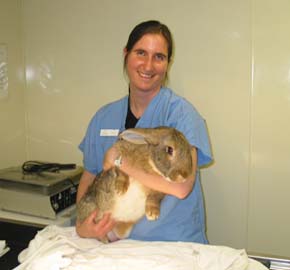Rabbit Husbandry From the Professionals at Community Animal Hospital in Morris County NJ

Rabbit Care
Rabbits make amazing pets and can be a great part of the family. They have different requirements than dogs and cats but with proper care can live 10-12 years or more.
Diet
Proper diet is one of the most important factors in rabbit health. Rabbits are strict herbivores and eat only plant based foods.
Hay is critical for rabbit digestion- Timothy hay should be offered free choice. Up to 75% of a rabbit's diet can be hay. Hay can be offered in bowls, baskets and even in the corner of the litterbox. Other hays such as Orchard grass, Oat hay and mixes including herbs and flowers are available and may help with finicky rabbits. Hay should be fresh, smell good and not moldy. Alfalfa hay is higher in calcium and should be limited to feeding to young bunnies only.
Pellets or rabbit chows should be offered in limited quantities. Rabbit pellets are higher in calories, lower in fiber and do not wear the teeth as much as hay. Fed in excess, pellets can lead to obesity and gastrointestinal issues.
Greens—Leafy green vegetables are an important part of a rabbit's diet. Greens should been introduced slowly then build up to allow 2-3 big handfuls daily. Good greens to offer include romaine lettuce, green or red leaf, cilantro, parsley, escarole, endive and carrot tops. Iceberg lettuce has minimal nutritional value and should be avoided. Dark green greens such as dandelion, kale and spinach have excessive calcium and should be avoided.
Water should be offered at all times. Rabbits will drink from either a bottle or bowl. Make sure to clean bowls/bottles regularly to avoid build up.
Vitamins are not required. Rabbits have a complex digestive system that creates their own vitamins. Cecotrophs, or night feces, are mucus covered feces that contain vitamins and other nutrients and bacteria that the rabbits re-ingest.
Housing
Rabbits are active and do best with large enclosures. Exercise pens with litterbox, toys, hide boxes and lots of hay are a great way to secure your bunny without the risks of free roaming around the house. Pens should be well padded to protect bunny's feet.
If using a cage— bigger is better. Avoid mesh bottoms which can be hard on their feet and risk for fractures. Recycled paper bedding is preferred. Aspen or pine are also ok but cedar should be avoided because it can cause liver problems.
Enclosures should be big enough for large areas of hay, hide box, toys, soft areas to sit as well as litterbox, food and water. Playtime out of the cage is especially important but make sure to bunny-proof checking for wires, wood and valuables that may be chewed.
Spaying and Neutering can have both medical and behavioral benefits to your rabbit. Female rabbits have a high incidence of uterine cancer and can become territorial if not spayed. Unneutered male rabbits may spray and mark as well as have risk of developing testicular masses when older. Rabbits are usually spayed and neutered at around 6 months. Your rabbit should have a complete physical exam and fecal examination for intestinal parasites prior to surgery.
Rabbit Illnesses
Dental Diseases are frequently encountered in rabbits. Rabbits' teeth, both the incisors and cheek teeth (premolars and molars) are continuously growing and need constant wearing down. If not properly aligned, broken, infected or fed improper diets, teeth can overgrow and even develop painful points which cut the cheeks or tongue. Signs of dental disease include poor appetite, difficulty eating, drooling, wet/red chin, and weight loss. Molar disease requires trimming under anesthesia. Proper diet can help prevent dental disease.
Abscesses are focal areas of infection and usually appear as a bump under the skin, sometimes with a scab. Dental abscesses are common sequela to dental disease and usually appear on the jaw or under the eyes. Other abscesses can appear on the feet or body. Rabbit's abscesses can be difficult to clear and early treatment, frequently involving surgery is often needed.
Gastrointestinal Stasis is a potentially life-threatening condition. Rabbit's with GI stasis have decreased or no appetite, smaller, dry or absent fecal balls, can show abdominal pain and frequently are lethargic or hiding. Stasis can come on suddenly and needs prompt medical attention. Diets high in hay can help prevent gastrointestinal stasis.
Respiratory infections commonly referred to as "snuffles" in rabbits usually present as sneezing and nasal discharge sometimes accompanied by runny eyes or decreased appetite. Respiratory infections can be difficult to clear and may require antibiotics and nose drops.
Parasites of both the gastrointestinal tract and the skin can pose problems for rabbits. Coccidia is a protozoal parasite that can affect the intestines and liver, most commonly of young rabbits. Affected animals may have diarrhea, poor weight gain, unkept coats and can cause death. Fecal exam can detect this parasite and anti-coccidial drugs can be used to treat it.
Cheylatiella is a mite infection also called "walking dandruff". This infection causes itchy, flaky, crusty skin- most commonly observed over the shoulders and rump. Treatment with selectamin (Revolution) or ivermectin can eliminate this itchy condition.



